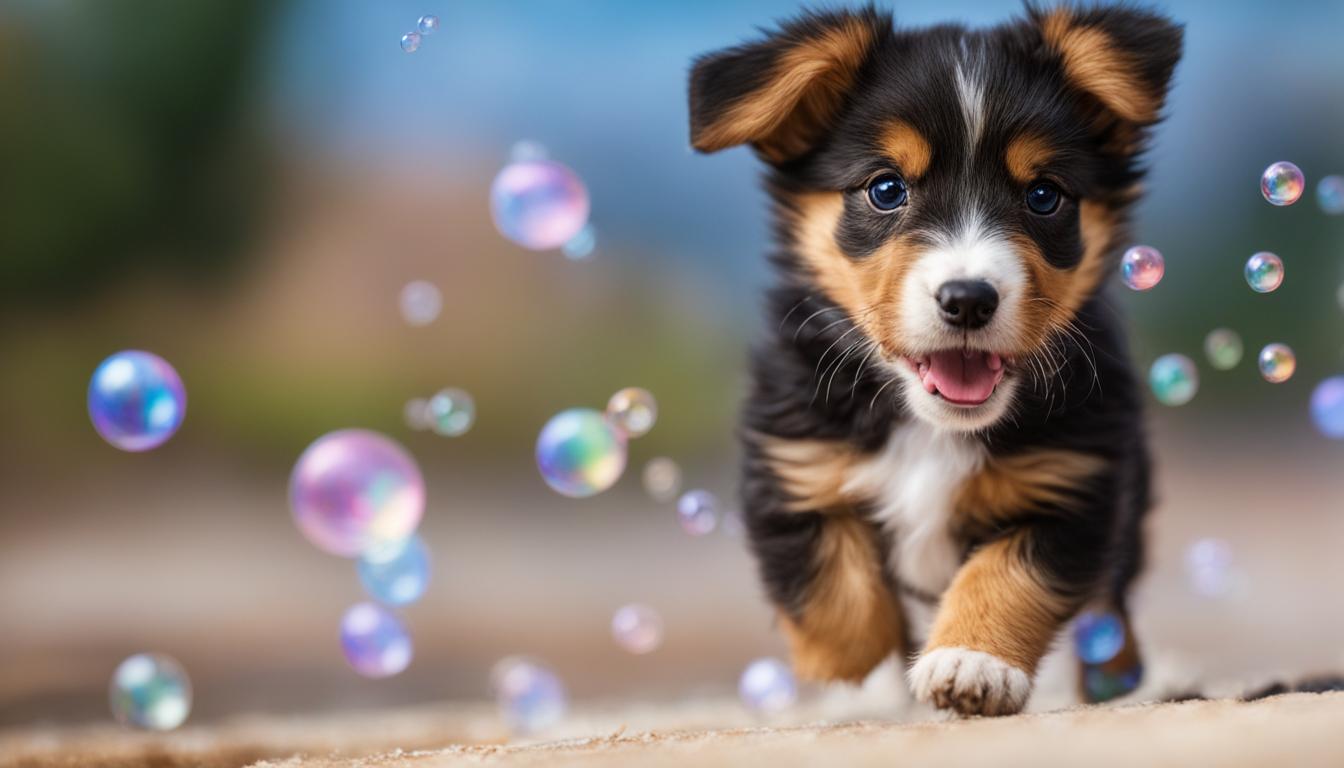As a pet owner, you may wonder if puppies get hiccups just like humans and adult dogs. The answer is yes! Puppies can experience hiccups, and it is actually quite common during their growth. But don’t worry, puppy hiccups are usually nothing to be concerned about.
Hiccups in puppies occur due to involuntary contractions of the diaphragm, similar to human hiccups. These spasms are harmless and can even happen while the puppies are still in their mother’s womb. While puppies may experience hiccups more frequently than adult dogs, the frequency tends to decrease as they get older.
Key Takeaways:
- Puppies can indeed get hiccups, which are caused by involuntary contractions of the diaphragm
- Hiccups in puppies are more common than in adult dogs and can occur frequently during their growth
- Puppy hiccups are harmless and tend to decrease in frequency as the puppy grows older
- There are several reasons why puppies get hiccups, including eating or drinking too quickly and stress
- Most puppy hiccups resolve on their own, but you can help by feeding smaller portions and calming their breathing
Causes of Puppy Hiccups
Puppies, just like humans and adult dogs, can experience hiccups. While hiccups in puppies are generally harmless, it’s important to understand the causes behind them. Here are some common reasons why puppies get hiccups:
Eating or Drinking Too Quickly
Rapid ingestion of food or water can lead to hiccups in puppies. When a puppy eats or drinks too quickly, they may swallow excess air, which can cause irritation in the diaphragm and trigger hiccups.
Spicy Foods
It may surprise you, but spicy foods can also be a culprit for puppy hiccups. The stimulation of neuron activity in the diaphragm caused by the consumption of spicy foods can lead to hiccups in puppies.
Stress and Overexcitement
Puppies can experience hiccups as a result of stress or overexcitement. These emotions can lead to shallow breathing, irritating the diaphragm and causing hiccups.
Natural Gas Expulsion
Hiccups in puppies can sometimes be a natural way for them to expel excess gas from their stomach. Similar to how humans may release gas through burping or flatulence, puppies may experience hiccups as a means of releasing gas.
Fun Fact: Did you know that hiccups can even occur when a puppy is still in their mother’s womb?
| Possible Causes of Puppy Hiccups | |
|---|---|
| Eating or Drinking Too Quickly | Swallowing excess air |
| Spicy Foods | Stimulation of neuron activity in the diaphragm |
| Stress and Overexcitement | Shallow breathing and diaphragm irritation |
| Natural Gas Expulsion | Releasing excess gas from the stomach |
Understanding the causes of puppy hiccups can help pet owners better manage their furry friends’ wellbeing. While most instances of puppy hiccups are harmless and resolve on their own, it’s always a good idea to monitor your puppy’s behavior. If you have any concerns or notice persistent hiccups accompanied by other abnormal symptoms, it’s best to consult a veterinarian for guidance.
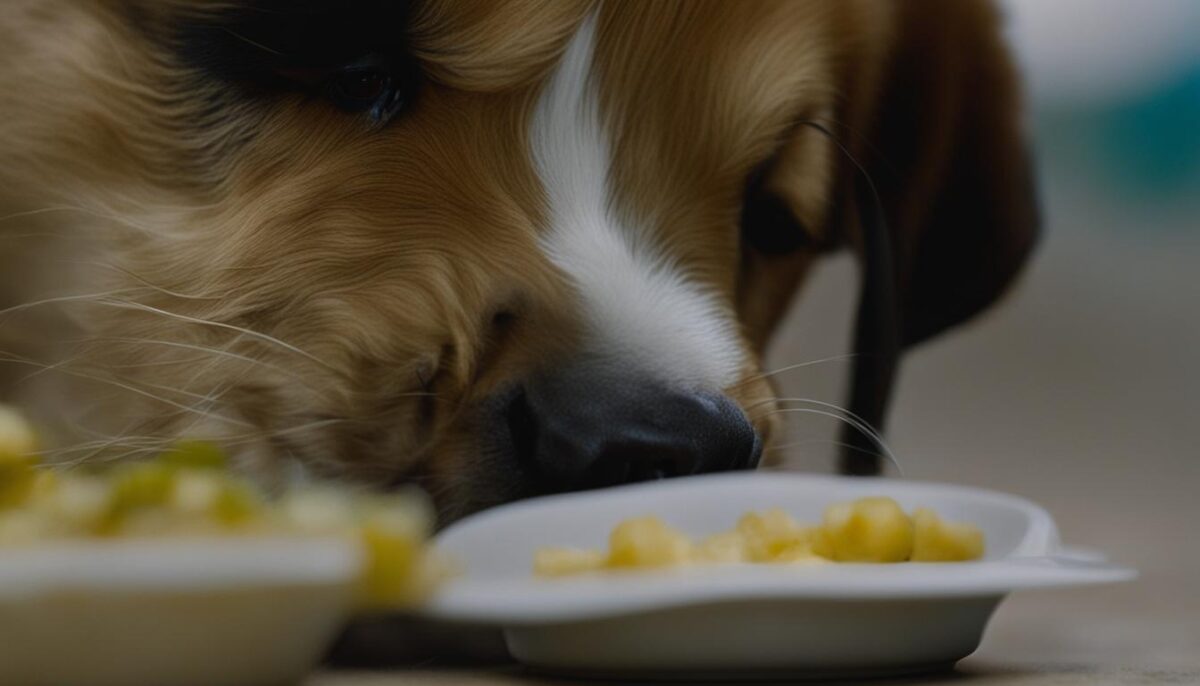
Treating Puppy Hiccups
While most puppy hiccups resolve on their own without any treatment, there are a few things you can try to help your furry friend during a bout of hiccups. Here are some remedies that may provide relief:
- Feeding smaller portions: If your puppy tends to get hiccups after eating, try offering smaller, more frequent meals. This can prevent hiccups caused by eating too quickly and swallowing excess air.
- Slowing down eating: Encourage your puppy to eat at a slower pace. Slow eating can reduce the chances of hiccups caused by gulping down food or water too quickly.
- Gently rubbing the stomach: Calm irregular breathing by gently rubbing your puppy’s stomach. This can help relax the diaphragm and alleviate hiccups.
- Offering water: Providing a small amount of water for your puppy to drink can sometimes help relieve hiccups. Just make sure the water is at room temperature to avoid any sudden temperature changes that could irritate the throat.
Remember, it’s important to be patient when dealing with puppy hiccups. Avoid trying to scare or startle your puppy to stop the hiccups, as this can cause unnecessary stress. Instead, try these gentle remedies to help your furry companion find relief.
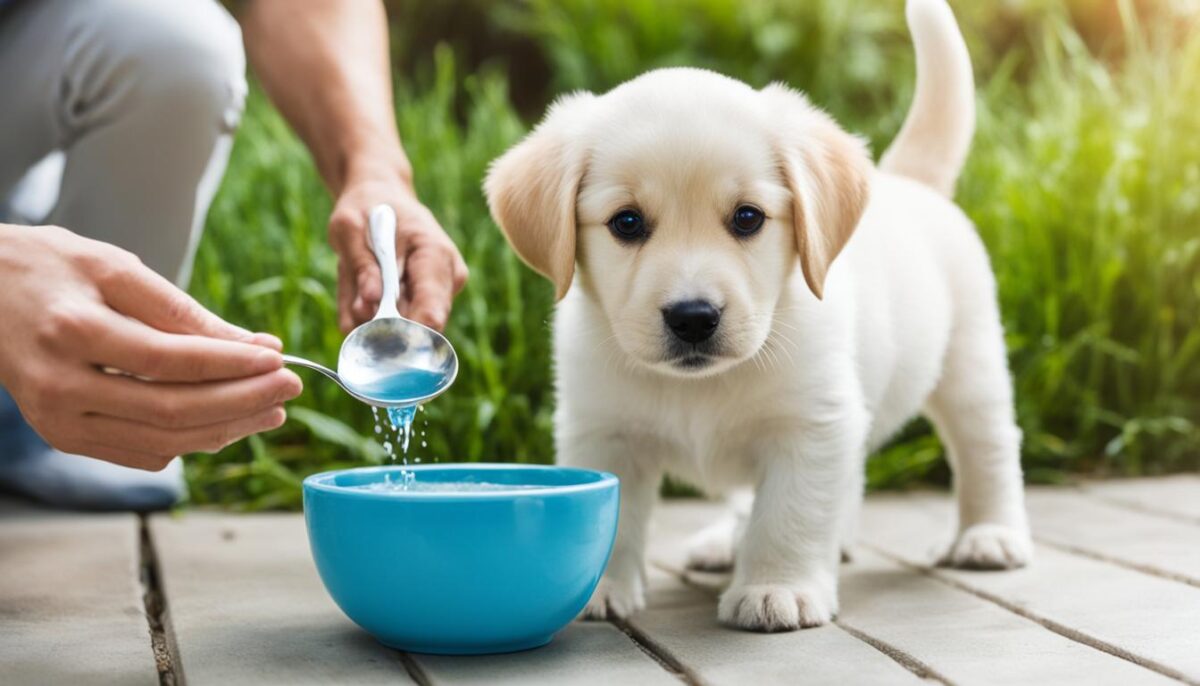
Did You Know? Trying to scare or startle your puppy to stop the hiccups is not recommended as it may cause more stress for them.
Preventing Puppy Hiccups
While it may not be possible to prevent puppy hiccups entirely, there are some measures you can take to minimize their occurrence. By implementing these preventive measures, you can ensure your puppy’s comfort and well-being.
1. Be Mindful of Food Temperature
One way to prevent puppy hiccups is by avoiding giving them overly hot or cold foods. Extreme temperatures can irritate the esophagus, making hiccups more likely to occur. Instead, strive to serve your puppy meals at a moderate temperature, neither too hot nor too cold.
2. Opt for Smaller, More Frequent Meals
Feeding your puppy smaller, more frequent meals can also help prevent hiccups. Puppies tend to eat quickly, which can lead to swallowing excess air, a common trigger for hiccups. By offering smaller portions throughout the day, you can minimize the chances of hiccups caused by rapid eating.
3. Encourage Slow and Calm Eating
Promoting slow and calm eating habits in your puppy can be beneficial in preventing hiccups. Encourage your puppy to eat at a relaxed pace by providing a quiet and stress-free eating environment. You can also consider using puzzle toys or slow-feeders to help slow down their eating speed.
Implementing these preventative measures can significantly reduce the frequency of puppy hiccups and ensure a more comfortable experience for your furry friend.
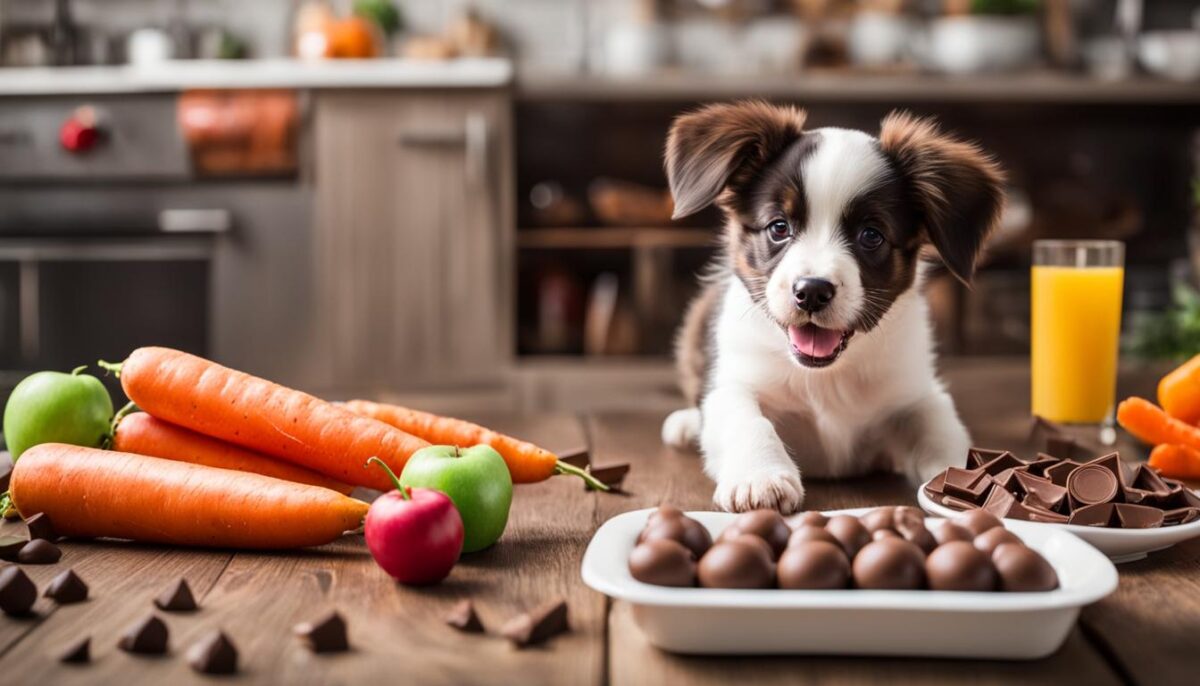
Remember, while hiccups in puppies are generally harmless and resolve on their own, if your puppy experiences prolonged hiccups or other concerning symptoms, it is always best to consult with a veterinarian for further guidance and support.
When to Seek Veterinary Care
In most cases, hiccups in puppies are not a cause for concern. However, it is important to be aware of when to seek veterinary care for your puppy’s hiccups. While hiccups are typically harmless, there are certain situations where professional guidance may be necessary to ensure your puppy’s health and well-being.
If your puppy experiences hiccups for an extended period, such as more than a few hours, it is advisable to consult with a veterinarian. Prolonged hiccups could potentially indicate an underlying health issue that needs to be addressed. A veterinarian will be able to assess your puppy’s condition and provide appropriate guidance.
Additionally, if the hiccups are accompanied by other symptoms, such as wheezing, irregular breathing, or difficulty swallowing, it is crucial to seek veterinary care promptly. These symptoms may be indicative of a more serious health concern that requires immediate attention.
Remember, as a pet owner, you play an essential role in monitoring your puppy’s health. If you are ever unsure or concerned about your puppy’s well-being, it is better to be safe and seek professional advice. Your veterinarian is the best resource to address any questions or concerns regarding your puppy’s hiccups and overall health.
Signs to Seek Veterinary Care for Puppy Hiccups
- Hiccups lasting more than a few hours
- Accompanied by wheezing or irregular breathing
- Difficulty swallowing
By staying attentive to your puppy’s symptoms and seeking timely veterinary care when necessary, you can ensure their health and well-being. Remember, it’s always better to err on the side of caution when it comes to your furry friend’s health.
Dog Hiccups: Similarities to Human Hiccups
Dog hiccups share striking similarities to human hiccups, as they both occur due to a spasm of the diaphragm. Just like humans, dogs and puppies can experience hiccups for various reasons, including eating or drinking too quickly, stress, or excitement.
Similar to puppies, dogs typically outgrow hiccups as they age. While hiccups may be more frequent and noticeable in puppies, the frequency and severity of hiccups tend to decrease over time.
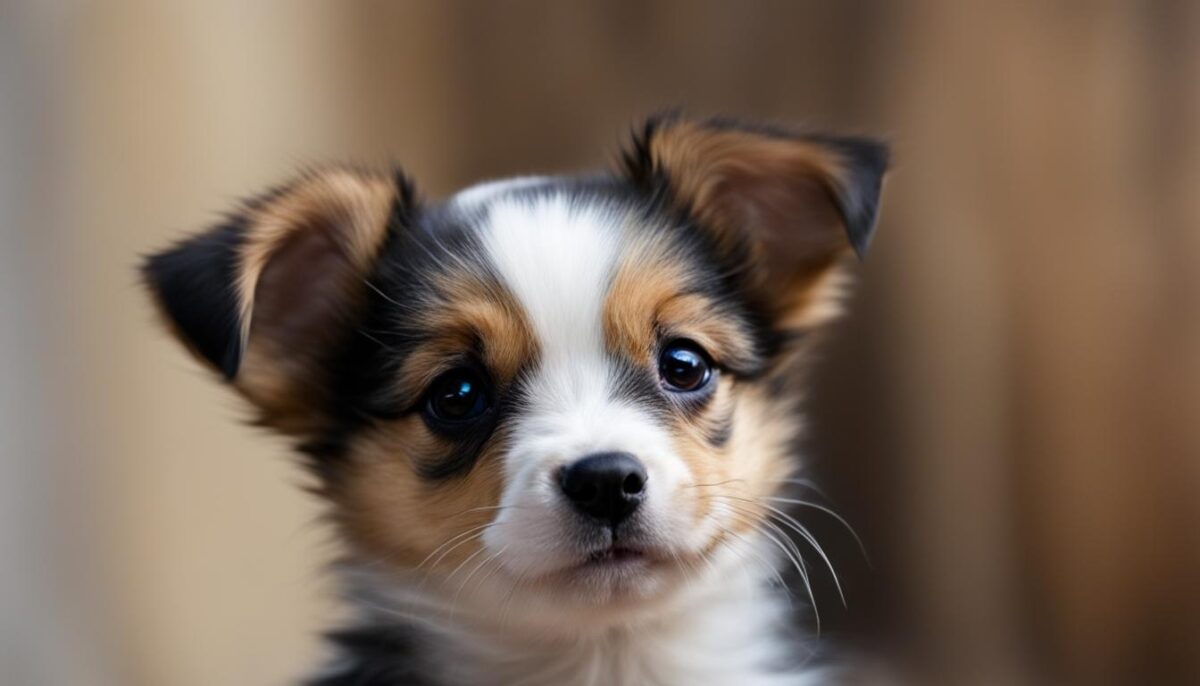
Getting Rid of Hiccups in Dogs
While hiccups in dogs can be an inconvenience, there are some strategies you can try to alleviate them. Remember, there is no foolproof method to stop hiccups in dogs, but these remedies may offer some relief.
Gentle Stimulation
One option is to calm your dog’s breathing pattern through gentle stimulation of their chest and throat. Gently stroke or massage their chest in a soothing manner, helping them relax their diaphragm and potentially ease the hiccups.
Calm Drinking
Offer your dog water and encourage slow, calm drinking. This can help relax their breathing and potentially stop the hiccups. It’s important to avoid giving your dog large amounts of water at once or forcing them to drink quickly, as this can exacerbate hiccups or lead to other digestive issues.
Be Patient
When your dog experiences hiccups, it’s essential to be patient. Hiccups in dogs are usually harmless and often resolve on their own. Trying to startle or scare your dog to stop the hiccups may cause unnecessary stress and will not provide a long-term solution. Instead, provide a calming environment and wait for the hiccups to subside naturally.
Remember, if your dog’s hiccups persist for an extended period or are accompanied by other concerning symptoms, it’s best to consult your veterinarian for further guidance.
Conclusion
Hiccups are a normal part of our puppy’s development and are generally nothing to worry about. While they can be more frequent in puppies, they tend to decrease as they grow older. Most of the time, puppy hiccups are harmless and do not require any specific treatment.
However, if your puppy’s hiccups persist for a prolonged period or are accompanied by other concerning symptoms, it’s important to seek veterinary care. This can help rule out any underlying health issues and ensure your puppy’s well-being.
By understanding the causes of puppy hiccups, such as eating or drinking too quickly, stress, and excitement, you can take preventive measures to minimize their occurrence. Feeding your puppy smaller portions, slowing down their eating, and avoiding hot or cold foods can help prevent hiccups. Remember to offer your puppy water and encourage calm drinking to alleviate hiccups.
Taking care of your puppy’s health includes being attentive to their hiccups. By providing love, care, and a bit of patience, you can ensure that your furry friend grows up healthy and happy.
FAQ
Do puppies get hiccups?
Yes, puppies can get hiccups just like humans and adult dogs. It is a normal occurrence and usually nothing to be worried about.
What causes hiccups in puppies?
Several factors can cause hiccups in puppies, including eating or drinking too quickly, spicy foods, stress, overexcitement, and expelling excess gas from the stomach.
How can I treat puppy hiccups?
Most puppy hiccups resolve on their own without treatment. However, you can help your puppy by feeding smaller portions, slowing down their eating, gently rubbing their stomach, or offering water to drink.
How can I prevent puppy hiccups?
To minimize the occurrence of hiccups in puppies, avoid giving them overly hot or cold foods and feed them smaller, more frequent meals to prevent eating too quickly and swallowing excess air.
When should I seek veterinary care for puppy hiccups?
While hiccups in puppies are usually harmless, if they persist for an extended period or are accompanied by other concerning symptoms like wheezing or difficulty swallowing, it is best to seek veterinary care.
Are dog hiccups similar to human hiccups?
Yes, dog hiccups are caused by a spasm of the diaphragm, similar to human hiccups. However, dogs typically outgrow hiccups as they age, with the frequency and severity decreasing over time.
How can I get rid of hiccups in dogs?
While there is no foolproof method to stop hiccups in dogs, you can try calming the dog’s breathing pattern through gentle stimulation of their chest and throat, offering them water to drink, or encouraging slow, calm drinking.
Do puppies get hiccups frequently?
Yes, hiccups are more common in puppies and can happen frequently during their growth. However, the frequency of hiccups usually decreases as the puppy grows older.

